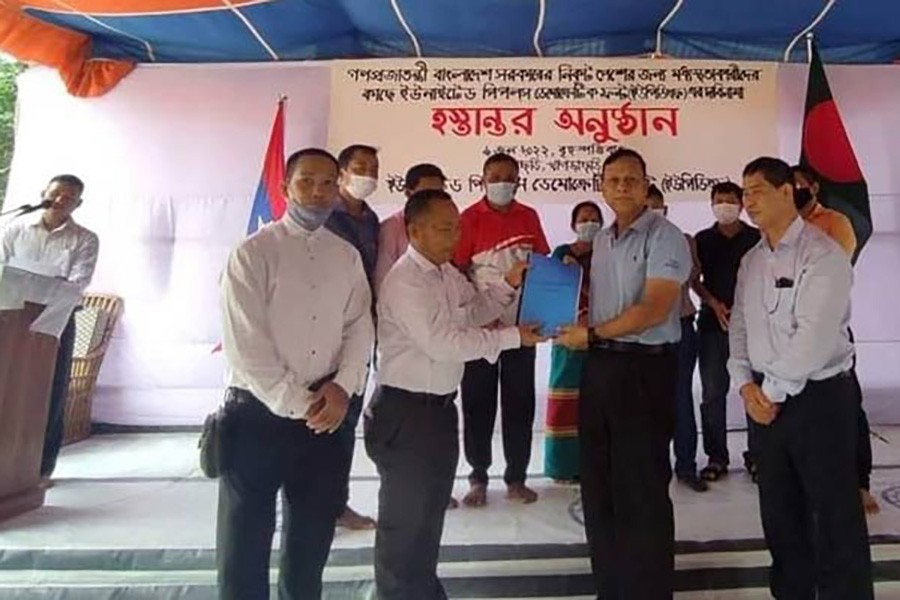The United People’s Democratic Front or UPDF, the group born two decades ago out of opposition to the peace accord for the Chattogram Hill Tracts, has proposed a brand new agreement to end violence in the hills, Reuters reports.
In the proposal, which was presented to the government through a mediator, the UPDF asked for a timeline for the implementation of the existing peace deal and said it is ready to enter a dialogue with the government and other parties of the hill tracts if it comes to that.
Home Minister Asaduzzaman Khan in the past spoke of efforts to establish peace and stop violence in the rolling hills, but he declined comment on UPDF’s latest proposal.
The UPDF, which seeks full autonomy in the Chattogram Hill Tracts through peaceful and democratic means, was founded in December 1998 at a conference in Dhaka under the leadership of Proshit Bikash Khisa.
Parbatya Chattogram Jana Sanghati Samity or JSS, the organisation of Jyotirindra Bodhipriya Larma, better known as Shantu Larma, and the UPDF have been at loggerheads, sometimes violently, since the signing of the peace deal in 1997 during the tenure of the Awami League government.
The UPDF’s latest move for peace comes amidst the re-emergence of unrest among the hill tracts organisations over the last few years.
Ujjal Smriti Chakma, UPDF central committee member, handed the proposal to Md Emdadul Islam, a retired major who is acting as the mediator, in a programme in Khagrachhari earlier this month.
Angya Marma, convener of the UPDF's Khagrachhari chapter, said in the meeting that the proposal was a result of several meetings with “government representatives” since 2019.
“Many years have passed since the [Chattogram Hill Tracts] peace accord was signed, but it has not been made a reality yet. There are some issues in the deal that need revision as well. The situation is quite delicate for different reasons now. So we've presented the proposal for a new pact,” he said.
Former army officer Emdadul confirmed having “officially received” the written proposal.
Emdadul took part in the CHT Peace Accord talks when he was serving in the Bangladesh Army. He was also Bangladesh’s chief of mission in Myanmar and later went to Congo for the United Nations peacekeeping mission.
“It's the result of efforts of many days. We discussed it with them [UPDF] for a long time. They took time to prepare the proposal before presenting it to us,” Emdadul said.
He said the proposal will soon be sent to the government.
The home minister said, “I’m also hearing what you’ve heard. We call it progress only when something happens. But it's still early days. Let something come up, then I’ll let you know.”
“We're doing everything to establish peace and stop violence in the hill tracts,” he said, refusing to comment on whether they had received the proposal yet.
WHAT IS IN THE PROPOSAL
The UPDF’s proposal contains 87 demands and is divided into eight parts presented in the form of an agreement. The 66-page document also lays out the arguments behind each demand.
The divisions are - constitutional status, repeal and amendment of certain laws other than constitutional law, declaration of a reserved area, reformation of Chittagong Hill Tracts Regional Council Act 1988, reforms to the hill district council laws, police force and administration, withdrawal of cases, rehabilitation and other issues, accord implementation committee and its enforcement.
UPDF Convener Angya said they suffered the most in the ongoing conflict in the hill tracts.
“We're still tolerant and trying to stop the conflict and establish the people’s democratic rights. The government also appears to be sincere. A scope to hold talks is emerging. So this proposal has been tabled before going into a dialogue with the government.”
Underscoring the need for all parties to be present in a potential dialogue, Angya said, “There is no alternative to this.”
He mentioned that letters have also been sent to JSS President Shantu Larma and the Parbatya Chattogram Jana Samhati Samiti (MN Larma) president and general secretary.
“Sending letters before going into a dialogue is an organisational protocol. We’ve let them know about the topics of the new proposal. If they think it is possible to cooperate, then all factions may be present in the discussion.”
Shantu Larma and three other top JSS leaders could not be reached for comment.
Another JSS leader, who did not want to be named, declined to comment on it.


